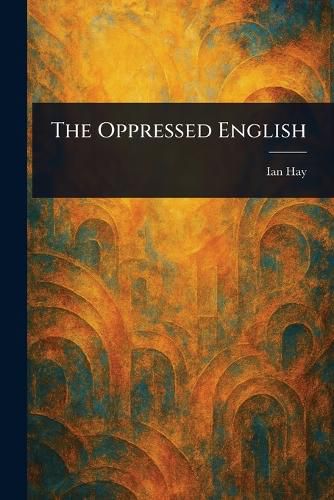Readings Newsletter
Become a Readings Member to make your shopping experience even easier.
Sign in or sign up for free!
You’re not far away from qualifying for FREE standard shipping within Australia
You’ve qualified for FREE standard shipping within Australia
The cart is loading…






This title is printed to order. This book may have been self-published. If so, we cannot guarantee the quality of the content. In the main most books will have gone through the editing process however some may not. We therefore suggest that you be aware of this before ordering this book. If in doubt check either the author or publisher’s details as we are unable to accept any returns unless they are faulty. Please contact us if you have any questions.
Ian Hay's "The Oppressed English" delves into the intricacies of English identity and national character. This social commentary examines the nuances of British culture with a particular focus on English nationalism. Exploring themes of social structure and national consciousness, Hay offers a compelling perspective on the English experience.
This book meticulously analyzes what it means to be English, dissecting cultural norms and societal expectations. It provides a historical lens through which to understand the development of English identity. Readers interested in the sociology of Great Britain, its political landscape, and the shaping of its national character will find this work insightful. "The Oppressed English" remains a relevant study for anyone seeking a deeper understanding of the forces that have molded England and its people.
This work has been selected by scholars as being culturally important, and is part of the knowledge base of civilization as we know it.
This work is in the public domain in the United States of America, and possibly other nations. Within the United States, you may freely copy and distribute this work, as no entity (individual or corporate) has a copyright on the body of the work.
Scholars believe, and we concur, that this work is important enough to be preserved, reproduced, and made generally available to the public. We appreciate your support of the preservation process, and thank you for being an important part of keeping this knowledge alive and relevant.
$9.00 standard shipping within Australia
FREE standard shipping within Australia for orders over $100.00
Express & International shipping calculated at checkout
This title is printed to order. This book may have been self-published. If so, we cannot guarantee the quality of the content. In the main most books will have gone through the editing process however some may not. We therefore suggest that you be aware of this before ordering this book. If in doubt check either the author or publisher’s details as we are unable to accept any returns unless they are faulty. Please contact us if you have any questions.
Ian Hay's "The Oppressed English" delves into the intricacies of English identity and national character. This social commentary examines the nuances of British culture with a particular focus on English nationalism. Exploring themes of social structure and national consciousness, Hay offers a compelling perspective on the English experience.
This book meticulously analyzes what it means to be English, dissecting cultural norms and societal expectations. It provides a historical lens through which to understand the development of English identity. Readers interested in the sociology of Great Britain, its political landscape, and the shaping of its national character will find this work insightful. "The Oppressed English" remains a relevant study for anyone seeking a deeper understanding of the forces that have molded England and its people.
This work has been selected by scholars as being culturally important, and is part of the knowledge base of civilization as we know it.
This work is in the public domain in the United States of America, and possibly other nations. Within the United States, you may freely copy and distribute this work, as no entity (individual or corporate) has a copyright on the body of the work.
Scholars believe, and we concur, that this work is important enough to be preserved, reproduced, and made generally available to the public. We appreciate your support of the preservation process, and thank you for being an important part of keeping this knowledge alive and relevant.